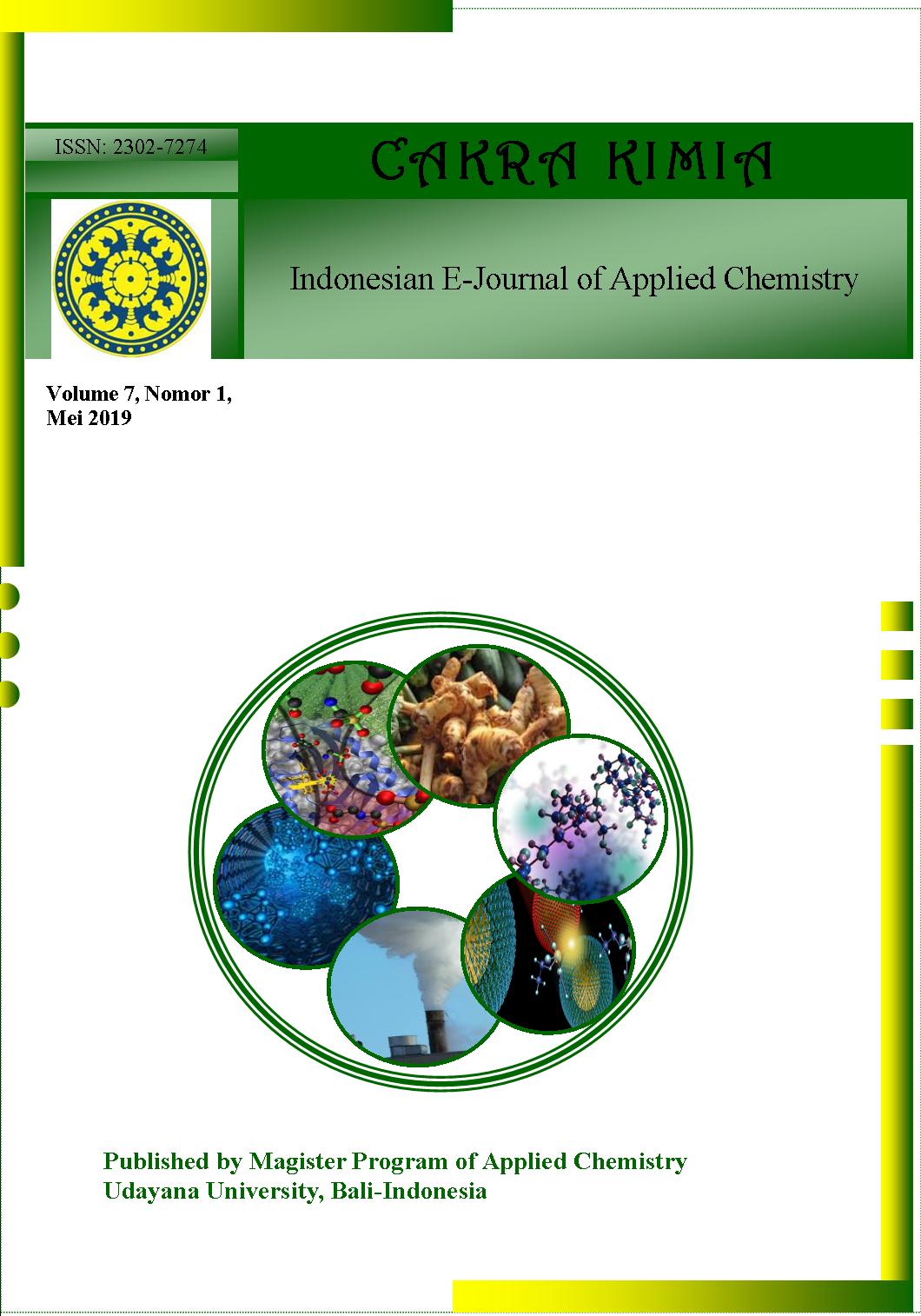¬¬PEMANFAATAN EKSTRAK BUAH Psidium Guajava SEBAGAI GREEN INHIBITOR UNTUK KOROSI BESI PADA LARUTAN ASAM SULFAT
Abstract
ABSTRAK: Efek inhibisi dari ekstrak buah Psidium Guajava (PG) pada korosi logam besi dipelajari dengan menggunakan metode penurunan berat. Laju korosi besi dalam media PG-H2SO4 berkurang secara relatif terhadap media larutan H2SO4 tanpa PG. Efisiensi inhibisi meningkat dengan semakin banyaknya konsentrasi ekstrak dan serta kenaikan suhu. Efisiensi inhibisi tertinggi tercatat 83,63% pada konsentrasi ekstrak 10 g/L pada 60 °C. Energi aktivasi (Ea) korosi besi dalam medium PG-H2SO4 lebih rendah dari pada tanpa PG. Parameter termodinamika yang telah dihitung menunjukkan bahwa proses inhibisi korosi adalah endotermik dan spontan. Adsorpsi PG pada permukaan besi sesuai dengan model adsorpsi isoterm Langmuir.
Kata Kunci : asam sulfat, green inhibitor, isoterm langmuir, Psidium Guajava
ABSTRACT: The inhibitory effect of Psidium Guajava (PG) fruit extract on iron metal corrosion was studied using the weight loss method. The corrosion rate of iron in the PG-H2SO4 medium was reduced relative to the medium of H2SO4 without PG. The inhibition efficiency increases with increasing concentration of extracts and increases in temperature. The highest inhibition efficiency was 83.63% at an extract concentration of 10 g/L at 60 °C. The activation energy (Ea) iron corrosion in the PG-H2SO4 medium was lower than without PG. Thermodynamic parameters that have been calculated, indicating the corrosion inhibition processes are endothermic and spontaneous. The adsorption of PG on the iron surface was accordance with the Langmuir isotherm adsorption model.
Downloads
References
[2] Verma, C., Ebenso, E. E., Bahadur I., & Quraishi, M. A. (2018). An overview on plant extracts as environmental sustainable and green corrosion inhibitors for metals and alloys in aggressive corrosive media, J Mol Liq, 266, 577-590.
[3] Mahidashti, Z., Shahrabi, T., & Ramezanzadeh, B. (2018). The role of post-treatment of an ecofriendly cerium nanostructure Conversion coating by green corrosion inhibitor on the adhesion and corrosion protection properties of the epoxy coating, Prog Org Coat, 114, 19-32.
[4] Haruna, K., Obot, I. B., Ankah, N. K., Sorour, A. A., & Saleh, T. A. (2018). Gelatin: A green corrosion inhibitor for carbon steel in oil well acidizing environment, J Mol Liq, 264, 515-525.
[5] Hu, W., Li, C., & Shchukin, D. G. (2018). Ceramic honeycomb-like alumina film as corrosion inhibitor carrier and mechanism analysis, Colloids Surf. A, 555, 237-245.
[6] Wang, L., Lu, F., Liu, Y., Wu, Y., & Wu, Z. (2018). Photocatalytic degradation of organic dyes and antimicrobial activity of silver nanoparticles fast synthesized by flavonoids fraction of Psidium guajava L. leaves, J Mol Liq, 263, 187-192.
[7] Wysocka, J., Cieslik, M., Krakowiak, S., & Ryl, J. (2018). Carboxylic acids as efficient corrosion inhibitors of aluminium alloys in alkaline media, Electrochim. Acta, 289, 175-192.
[8] Rassouli, L., Naderi, R., & Mahdavain, M. (2018). Study of the impact of sequence of corrosion inhibitor doping in zeolite on the self-healing properties of silane sol–gel film, Ind. Eng. Chem. Res, 66, 221-230.
[9] Moradi, M., Song, Z., & Xiao, T. (2018). Exopolysaccharide produced by Vibrio neocaledonicus sp. as a green corrosion inhibitor: Production and structural characterization, Mater Sci Technol, 34, 2447-2457.
[10] Mo, S., Li, L. J., Luo, H, Q., & Li, N. B. (2017). An example of green copper corrosion inhibitors derived from flavor and medicine: Vanillin and isoniazid, J Mol Liq, 242, 822-830.
[11] Saviour, A., Umoren., Abdullah, A., Ahmary, A., Gasem, Z. M., & Solomon, M. M. (2018). Evaluation of chitosan and carboxymethyl cellulose as ecofriendly corrosion inhibitors for steel. Int. J. Biol. Macromol, 117, 1017-1028.
[12] Chakraborty, S., Afaq, N., Singh, N., & Majumdar, S. (2018). Antimicrobial activity of Cannabis sativa, Thuja orientalis and Psidium guajava leaf extracts against methicillin-resistant Staphylococcus aureus, J. Integr. Med, 16(5), 350-357.



 Petunjuk Penulisan
Petunjuk Penulisan
